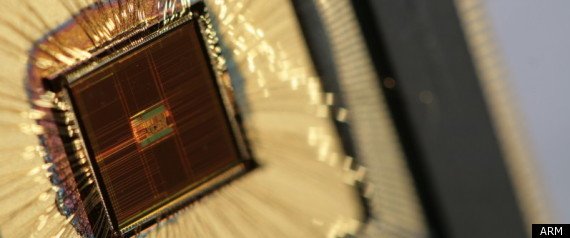ARM Holdings, one of the leaders in microprocessor Intellectual Property, has unveiled what it describes as the “world’s most energy-efficient microprocessor” design.
ARM Holdings says that microcontrollers based on the “Flycatcher” architecture will pave the way for the “internet of things” – the spread of the net to a wider range of devices.
It suggests that fridges and other white goods, medical equipment, energy meters, and home and office lighting will all benefit from the innovation.
Two companies have licensed the technology.
They are NXP Semiconductors and Freescale.
“It opens up all devices to the potential of being connected all the time,” said Freescale’s Geoff Lees.
“It’s allowing us to provide connectivity everywhere. So anything from consumer appliances, MP3-music audio docks, kitchen equipment with displays right through to remote sensors in rain monitoring equipment or personal medical devices – an area where ultra-long battery life allied to high performance and safety is becoming more and more important.”

The Cortex -M0+ architecture is designed to provide chip-makers with the means to build microcontrollers that require “ultra low power” but are capable of 32-bit processing.
ARM says it went back to the drawing board to create the new processor cores which measure 1mm by 1mm in size.
It says the microcontrollers should draw around a third less energy than their predecessors, which only offered 8 and 16-bit capabilities.
It adds that its design has been created to be a low leakage part – meaning it consumes almost no power when it is in sleep mode. The firm says that means devices can offer wireless connectivity when paired with modern bluetooth or radio equipment, offering years of life from a single battery-pack rather than months.
ARM’s director of embedded marketing Gary Atkinson says it could herald a new generation of smart energy systems.
“Every developed nation country has a graph showing electricity demand is going to outstrip supply at some point in the next 20 years unless we do something different,” Gary Atkinson said.
“What we need to do is something called design response – where all the devices on the network can make a decision as to whether or not to come on in order to smooth out peaks and troughs in electricity demand.
“So you should add connectivity to things like fridges, washing machines, freezers and dishwashers. If the wider electricity network is being very heavily used and if the element in your dishwasher could go off for two or three minutes to alleviate that – well then that would make a big difference.”
ARM says it expects the microcontrollers will sell for around 13-20 pence per device – and it will charge its clients about a 1-2% royalty fee from that price on top of a license charge.
Although the sums may appear small, the firm notes that Ericsson recently forecast there would be 50 billion connected devices by 2020 compared to 10-15 billion at present.
ARM says much of that growth will come from types of equipment that are not connected to the net at present – presenting the firm and its customers with a huge growth opportunity.
However the Cambridge-based company does not have the market to itself.
Arizona-headquartered Microchip Technology designs and builds a rival range of 32-bit “Pic” microcontroller, while California-based Atmel offers 32-bit “Avr” products.
[youtube I7pMRZowDuI]
